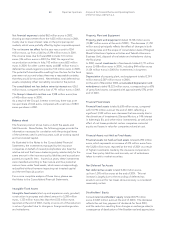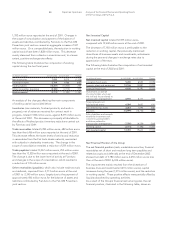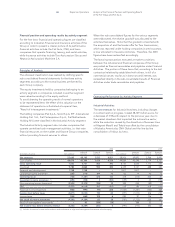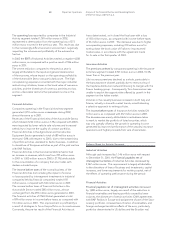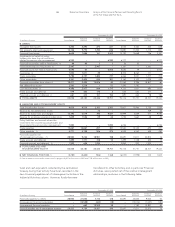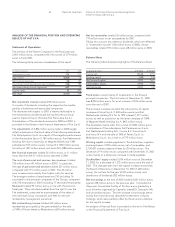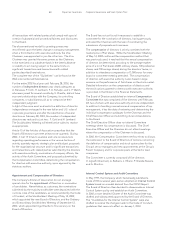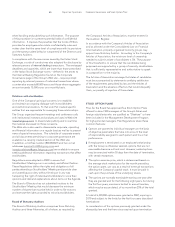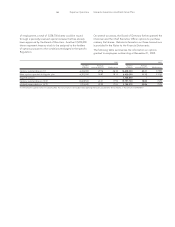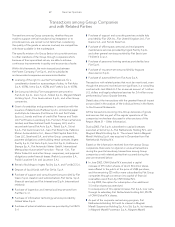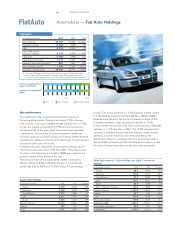Chrysler 2002 Annual Report Download - page 34
Download and view the complete annual report
Please find page 34 of the 2002 Chrysler annual report below. You can navigate through the pages in the report by either clicking on the pages listed below, or by using the keyword search tool below to find specific information within the annual report.
CORPORATE GOVERNANCE
The Fiat Group adopted and abides by the Code of Conduct
for Listed Companies in Italy that was revised in July 2002 by
the Corporate Governance Committee and is mentioned as a
model in the regulations issued by Borsa Italiana on corporate
governance. Furthermore, as its shares are also listed on foreign
markets, including the New York Stock Exchange, Fiat also refers
to foreign norms, and in particular United States laws, which,
since passage of the recent Sarbanes-Oxley Act, have imposed
more exacting obligations on foreign companies listed in that
country.
Also in accordance with the disclosure requirements set
forth in the Regulations of Borsa Italiana, the most important
aspects of the system of Corporate Governance adopted
by the Fiat Group are reviewed below. A complete overview
of the governance tools used by the Group is available on the
Web site “www.fiatgroup.com,” in the Corporate Governance
section.
Composition and Functions of the Board of Directors
As envisaged in the Company’s Articles of Association, the
number of members of the Board of Directors ranges from nine
to fifteen. Since its original appointment, the composition of
the current Board, which has 12 members, has changed several
times in consequence of the critical events that transpired
during the past several months.
Since the Board of Directors was appointed for a three-year
term by the Stockholders’ Meeting held on May 14, 2002, the
Chief Executive Officer Paolo Cantarella, who resigned on
June 10, was replaced in that capacity on June 26 by Gabriele
Galateri, with the vacant director’s seat being filled by Ugo
Draetta at the Stockholders’ Meeting held on September 12.
On December 10 Pierluigi Bernasconi was replaced by Daniel
J. Winteler, and on December 13 Ugo Draetta resigned so that
Chief Operating Officer Alessandro Barberis could be co-opted
on the Board after his nomination as Chief Executive Officer.
Finally, at the Board of Directors meeting held on February 28,
Chairman Paolo Fresco resigned so that Umberto Agnelli could
be immediately co-opted and appointed as Chairman, while
resigning members Felix G. Rohatyn and John F. Welch were
replaced through co-option of Giuseppe Morchio, appointed
as Chief Executive Officer, and Luca Cordero di Montezemolo.
Alessandro Barberis was named Vice Chairman.
Some of the current directors also hold positions at other listed
companies or of a significant interest. Excluding the positions
held by directors with executive authority at the Fiat Group,
the most significant are as follows:
❚Umberto Agnelli: Chairman, Giovanni Agnelli Sapa, and
Chairman, IFI S.p.A.
❚Alessandro Barberis: Director, CDC Point S.p.A.
❚Giuseppe Morchio: Director, Banco di Desio e della Brianza
❚Angelo Benessia: Vice Chairman, RCS Editori, and Director,
SAIAG S.p.A.
❚Luca Cordero di Montezemolo: Director, Tod’s S.p.A., Merloni
Elettrodomestici S.p.A., Unicredit Banca d’Impresa S.p.A.
❚Flavio Cotti: Chairman, Advisory Board of Credit Suisse Group
❚John Elkann: Director, Giovanni Agnelli Sapa, IFI S.p.A.,
Exor Group
❚Gabriele Galateri: Chief Executive Officer, IFI S.p.A., Director,
Accor S.A., Worms & Cie. S.A., Sanpaolo IMI S.p.A., Cassa di
Risparmio di Savigliano S.p.A.
❚Franzo Grande Stevens: Chairman, P. Ferrero & C. S.p.A.
and Davide Campari S.p.A., Director, IFI S.p.A., IFIL S.p.A.,
La Rinascente S.p.A., Pininfarina S.p.A., Banca del Piemonte,
Banca Sella, Exor Group, HDP S.p.A.
❚Hermann-Josef Lamberti: Member of Managing Board of
Deutsche Bank AG, Director, Eurex Deutschland, Euroclear
Bank S.A., Schering AG
❚Virgilio Marrone: Director, Sanpaolo IMI S.p.A., Juventus S.p.A.
❚Daniel J. Winteler: Director, IFIL, Worms & Cie, La Rinascente
S.p.A.
The Board of Directors appointed in May 2002 adopted the
customary model envisaged in the Articles of Association,
under which full operating powers of representation are
granted to all directors who hold corporate offices, severally.
Consequently, the Board granted the directors with executive
authority, the Chairman and the Chief Executive Officer, broad
operating powers, authorizing them to deal with ordinary and
extraordinary business that is consistent with the Company’s
purpose and not reserved by law or otherwise delegated or
reserved to the Board of Directors itself.
The Board defined the “Guidelines for Significant Transactions
and Transactions with Related Parties,” by which it reserved
the right to examine and approve in advance any transaction
of significance in the balance sheet, economic and financial
figures, including the most significant transactions with related
parties, and subject all transactions with related parties to
special criteria of substantial and procedural fairness.
Therefore, decisions regarding significant transactions are
excluded from the mandate granted to Board members with
executive authority. The term “significant transactions” refers
to those transactions that in and of themselves require the
company to inform the market thereof, in accordance with
rules established by market supervisory authorities.
When the Company needs to execute significant transactions,
the Board members with delegated powers shall provide the
Board of Directors reasonably in advance with a summary
analysis of the strategic consistency, economic feasibility,
and expected return for the Company.
Certain decisions regarding the most significant transactions
with related parties are also excluded from the mandate
granted to the Board members with delegated powers, while
32 Report on Operations
Corporate Governance and Stock Option Plans



